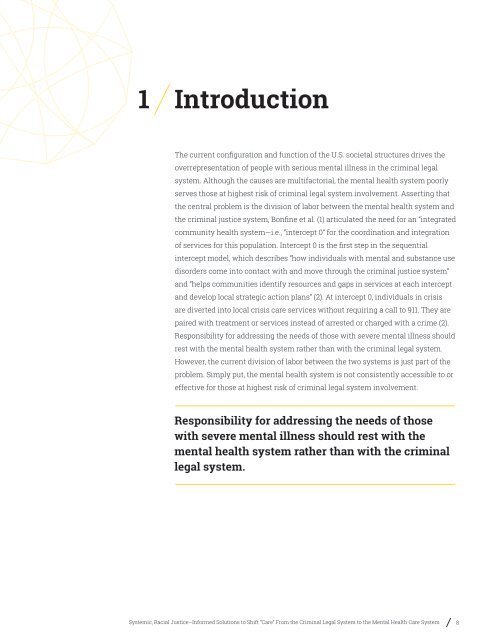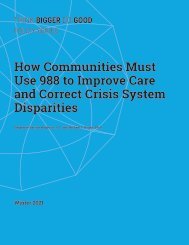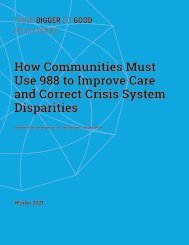Systemic, Racial Justice–Informed Solutions to Shift “Care” From the Criminal Legal System to the Mental Health Care System
Create successful ePaper yourself
Turn your PDF publications into a flip-book with our unique Google optimized e-Paper software.
1<br />
Introduction<br />
The current configuration and function of <strong>the</strong> U.S. societal structures drives <strong>the</strong><br />
overrepresentation of people with serious mental illness in <strong>the</strong> criminal legal<br />
system. Although <strong>the</strong> causes are multifac<strong>to</strong>rial, <strong>the</strong> mental health system poorly<br />
serves those at highest risk of criminal legal system involvement. Asserting that<br />
<strong>the</strong> central problem is <strong>the</strong> division of labor between <strong>the</strong> mental health system and<br />
<strong>the</strong> criminal justice system, Bonfine et al. (1) articulated <strong>the</strong> need for an “integrated<br />
community health system—i.e., “intercept 0” for <strong>the</strong> coordination and integration<br />
of services for this population. Intercept 0 is <strong>the</strong> first step in <strong>the</strong> sequential<br />
intercept model, which describes “how individuals with mental and substance use<br />
disorders come in<strong>to</strong> contact with and move through <strong>the</strong> criminal justice system”<br />
and “helps communities identify resources and gaps in services at each intercept<br />
and develop local strategic action plans” (2). At intercept 0, individuals in crisis<br />
are diverted in<strong>to</strong> local crisis care services without requiring a call <strong>to</strong> 911. They are<br />
paired with treatment or services instead of arrested or charged with a crime (2).<br />
Responsibility for addressing <strong>the</strong> needs of those with severe mental illness should<br />
rest with <strong>the</strong> mental health system ra<strong>the</strong>r than with <strong>the</strong> criminal legal system.<br />
However, <strong>the</strong> current division of labor between <strong>the</strong> two systems is just part of <strong>the</strong><br />
problem. Simply put, <strong>the</strong> mental health system is not consistently accessible <strong>to</strong> or<br />
effective for those at highest risk of criminal legal system involvement.<br />
Responsibility for addressing <strong>the</strong> needs of those<br />
with severe mental illness should rest with <strong>the</strong><br />
mental health system ra<strong>the</strong>r than with <strong>the</strong> criminal<br />
legal system.<br />
<strong><strong>System</strong>ic</strong>, <strong>Racial</strong> <strong>Justice–Informed</strong> <strong>Solutions</strong> <strong>to</strong> <strong>Shift</strong> <strong>“<strong>Care</strong>”</strong> <strong>From</strong> <strong>the</strong> <strong>Criminal</strong> <strong>Legal</strong> <strong>System</strong> <strong>to</strong> <strong>the</strong> <strong>Mental</strong> <strong>Health</strong> <strong>Care</strong> <strong>System</strong> 8

















